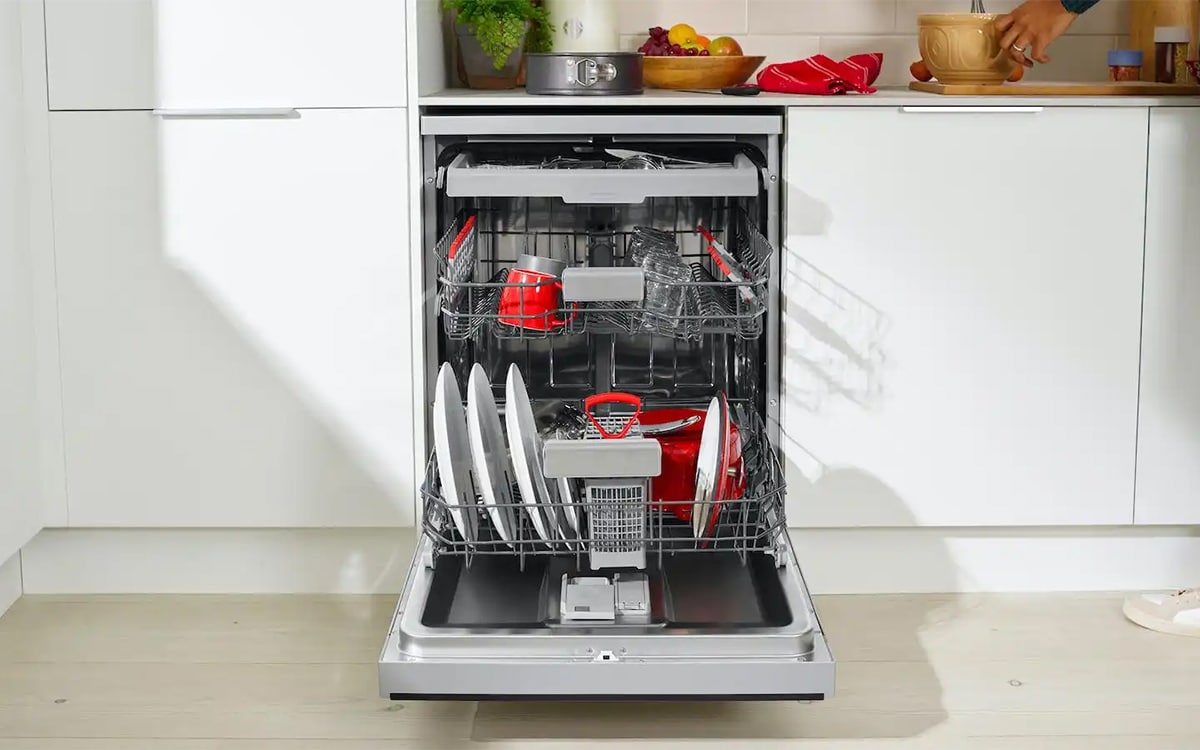But some dishwashers are better at drying than others. Are you finding that your dishwasher just doesn’t dry your dishes quite how you expect? It can be incredibly annoying!
Luckily, we’ve put together this article so you can investigate the cause of your dishwasher’s drying woes! We’re going to take a look at some common causes of inefficient dish drying, and find out how you can resolve the issue!
Why Do Some Dishwashers Not Dry Dishes Properly?
Unfortunately, dishwasher errors can be a result of any number of problems. This can make it difficult to point to just one cause!
Faulty Heating Element
The most common cause of dishwasher drying errors is the heating element itself. The heating element of your dishwasher is responsible for heating up the water and heating up the tub of your dishwasher.
When the heating element is damaged, it gets much harder for your dishwasher to create the right temperatures. This then has a direct impact on your dishwasher’s ability to dry your dishes with each cycle. If your dishwasher cannot recreate the right temperature, then there will be more water left on your dishes.
A faulty heating element will easily impact how well a dishwasher is able to dry dishes. When the heating element is damaged, it’s harder for the dishwasher to create the right conditions for drying.
If the heating element is to blame, it’s worth getting it repaired as soon as possible. A faulty heating element will also impact the efficiency of your dishwasher’s cleaning cycle. Colder water is less effective at cleaning away stubborn dirt and killing bacteria and mould.
Inefficient Loading
In order for the heating element to do its job, you need to make sure that the dishwasher is efficiently loaded! In order for all of that warm air to reach your dishes, you’ll need to ensure none of them are hidden away or stuffed behind any other dishes.
When you overfill your dishwasher, it becomes much harder for the warm air to reach all of your dishes. This will lead directly to pulling drenched dishes out at the end of the cycle!
You Chose The Wrong Cycle!
Many of us choose a favourite cycle and then stick with it every time we turn on the dishwasher. While this can help to eliminate a lot of guesswork, it could lead to you missing out on specific dishwasher functions.
If you find that your dishwasher isn’t drying your dishes properly, it could be because you’ve chosen a cycle that skips the drying phase. Some dishwasher cycles also have much shorter drying phases.
It’s worth taking a look through your dishwasher’s built-in cycles, to see if any of them offer longer drying phases.
A Faulty Vent
You might find that your dishwasher is unable to fully dry your dishes because the vents are blocked. When vents are blocked, it’s hard for steam to leave the tub, leaving it to instead latch onto your dishes.
Faulty vents can also make it tough for warm air to circulate around your dishwasher. This will make it difficult for the dishwasher to fully dry your dishes at the end of the cycle.
Again, this is an issue that you should try to have repaired as soon as you possibly can.

Your Dishwasher Is Too Old
Unfortunately, over time, a dishwasher’s efficiency will be naturally affected. With age, a dishwasher will become far less effective at washing and drying. This is especially the case for dishwashers older than 10 years. 10-year-old dishwashers are more likely to be faulty by merit of their worn-out parts.
If your dishwasher is older than 10 years, and it is having trouble drying your dishes, then we would recommend replacing it. Repairing a 10-year-old dishwasher can be incredibly expensive. You might save more by just buying a brand-new one!
You’re Not Using Rinse Aid
Rinse aid products are specially designed to reduce the amount of moisture in the dishwasher. In turn, this makes it much easier for the heating element to do its job and dry your dishes.
If you notice that your dishwasher isn’t drying your dishes effectively, then it might be worth buying some.
It’s easy to add it to your dishwasher’s cycle by simply dropping it into place in the dispenser drawer!
Frequently Asked Questions
Why Do Some Dishwashers Not Dry Dishes?
There are actually a number of potential reasons why a dishwasher may have trouble drying dishes. The most common reason is because the heating element is faulty. A faulty heating element will not be able to pump hot air around the chamber during the drying phase. This will leave your dishes still damp when you remove them. Your dishwasher may have also encountered an error with its vents.
Why Is My Brand New LG Dishwasher Not Drying?
If you’ve bought a brand new shiny LG dishwasher and you’ve found it’s not drying properly, it may be because you have overloaded it. When you overload the racks, you make it more difficult for the hot air to reach all of your dishes. This in turn makes it much harder for the dishes to dry.
Does Rinse Aid Help Dry Dishes?
Absolutely. Rinse aid products are designed to remove much of the moisture from your dishwasher. This in turn means that there is less water on your dishes for the drying phase to have to target. If you want your dishwasher to dry more effectively, then rinse aid should always be close to hand when using your dishwasher.
Should I Rinse Dishes Before Putting Them In The Dishwasher?
There’s no need to rinse your dishes before placing them in the dishwasher. Your dishwasher will be able to make short work of even the worst messes stuck to your dishes. Pre-rinsing your dishes simply wastes a ton of water that never needed to be used! Pre-rinsing is an archaic practice that no longer needs to be observed!







0 Comments